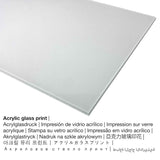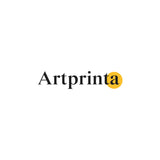Anthony van Dyck, 1624 - Saint Rosalie Interceding for the Plague-stricken of Palermo - fine art print
Tax included. Shipping calculated at checkout.
(© Copyright - by The Metropolitan Museum of Art - www.metmuseum.org)
Van Dyck was in Palermo, Sicily, when a plague broke out and the city was quarantined. On July 15, 1624, the remains of Saint Rosalie—the city’s patroness, who died about 1160—were opportunely discovered on Mount Pellegrino, which is visible here above the harbor of Palermo. Images of Saint Rosalie were in great demand; this one was painted by Van Dyck on top of a striking self-portrait that he had sketched on the canvas. The artist employed a design he had used earlier for paintings of the Assumption of the Virgin.
Structured artwork information
| Piece of art title: | "Saint Rosalie Interceding for the Plague-stricken of Palermo" |
| Artwork classification: | painting |
| Art classification: | classic art |
| Artwork century: | 17th century |
| Artpiece year: | 1624 |
| Age of artwork: | more than 390 years |
| Original medium of artwork: | oil on canvas |
| Size of the original artpiece: | 39 1/4 x 29 in (99,7 x 73,7 cm) |
| Museum: | The Metropolitan Museum of Art |
| Location of museum: | New York City, New York, United States of America |
| Web page: | The Metropolitan Museum of Art |
| License of artwork: | public domain |
| Courtesy of: | The Metropolitan Museum of Art, New York, Purchase, 1871 |
| Creditline: | Purchase, 1871 |
Artist overview
| Artist: | Anthony van Dyck |
| Alias names: | bandio, Ant. v. Dyck, Wandik, Dyck Antonie van, Anton de Dück, Van-Dyk, Antonio Vandich, Dyck Antoine van, Sir Anthony Vandyck, A.v. Dyck, Antony van Dyck, Anton van Dyck, Anthonius van Dijck, Ant Van Dick, A. Vandyck, von Dyck, Dyck Antoon van, After Van Dyck, Dyck Sir Anthony van, Antoine Van Dick, Vandiche, Dyck Anton van, bandic, Anthony Vandyke, A. Vaudick, Deĭk Antoni van, Van Daĭk Antonis, Van Vandyck, Dijck Antoon, Antonio van Deyc, Antoine Wandick, Vandeich, van Dyck Anton., Van Dycke Anthony, Van Dyck Anthony Sir, Antonio Vandichi fiamengho, comme de Van Dyck, Antoni van Dyk, Van Dijk, Van Dyck Antoine, Anton von Deyck, Ant v. Dyk, Anthony Vandycke, Van Deick, An. van Dyck, Anton van Dijck, antoon van dyck, Vandik Antonio, Vandyke Sir Anthony, Van Dich Antonio, Chevaliér van Dyk, Wandik Antonio, A.v. Dyk, A. Van Dick, Vandyck Sir Anthony, Van Dych, Dyck Anthonie van, Vandyke Anthony, V. Dyck, Valdiq, Vandyck &, van Deyck, Anth. Vandyke, sir a. van dyck, Ant. Vandyck, Ant. von Dyck, Antoine van Dyck, Vannic, A. Vandyk, Antoine Vandick, Ant. Vandeick, Vandych Antonio, Antoine Vandyk, Dack, Antonio Vandik, Van Dich, antonys van dyck, A. Van Dyc, Antonio van Deyck, Bandique, anthonius van dyck, Anth. van Dyk, Van Dyck School, Van-Dick, Antoine Van-Dyck, jan van dyck, Ant. Vandeyck, Antoin Vandyk, Antonii van Dyck, dyck van, Vandec, Daĭk Antonis van, Anthony van Dyk, An. Dyk, Vandech, A. v. Dyck, Van Dyck Antoon Sir, Anthonie van Dyk, A. van Dyk, A. Dyck, Antony van Dijck, Vannich, A. Vandick, Ant. Van Dyck, Bandeique, A. Vandych, Vandyck Antonio, Antonio Vandyck, Van. Dick, Vandicco, Dyck Anthonis van, Dyck Anthonie, A. van-Dyck, Vandyck Anthony, Wanclelfef, v. Dychs, Antonie van Dyck, Antoni v. Deick, von Deycks, Antoine Vandik, Antonio von Dyk, Bandiq, Van Dyck, Badic, Van-Deĭk Antoni, V. Dycke, A. Van Dik, Van Dyck Anthony, Vandycke, v. Dyk, A. van Dycl, Anth. van Dyck, dyck van a., Anthony Van Dyck Sir, Anthonis van Dyck, Anton van Dyk, Van Dyke, V Dyck, Mandique, dyck anton van, Van Dyck Anton, Valdique, dyck van, A. von Dyck, Vandique Anttonio, Ant. van Dyk, vandic, Vand Duyke, Dyck Ant. van, Wandick, Van Dyck Anthonis, von Deick, Van Dick Anthony, Dyck Antoon, Vandike, Ant. Vandick, A. van Dijk, Anthonij van Dijck, Antonio Vandicch, Sir Anthony van Dyck, Sir A. Vandyke, Antonio Dyck, Ant Van Dyck, Vandych, Dyk Anthonis van, Vandick, Wan Dick, Vandick A., Vandyk, Wandih, c., Anttonio Vandique, Dijck Sir Anthony van, Van Dyck Antonio, Ant.v. Dyck, Wan Dyck, A. Van Dyck, Dyck Sir, Antoine Van-Dick, Antt.o van Deyck, Vandich, Ant. v. Dyk, Vandeck, A Vandyke, Anthony Vandyck, Vandich Antonio, Dijk Anthony van, Vnaydke, Sr. Ant. Van. Dych, Anth. v. Dyck, Dyck Anthony van Sir, דייק אנטוני ואן, A Van Dyck, van dycke sir anthony, Van diq, von Deyck, Dyck Ant. van, Sir Antonio Van Dyck, Anton von Dyck, Wandyck, van dyck a., von Dyk, Vandicch Antonio, Ban Dycq, Van-Dyck, Antoni van Dyck, Anthon van Dyck, Dyck Antonis van, antonis van dyck, Antonio Vandych, Dyck Anthony van, Vandique, Vandyck Sir Ant. Flem., Antoine Vandeik, Antony van Dyk, Van Dyc, Vandeyc, Anton Vandyk, Dyck A. van, V. Dyke, Antoine Vandich, A. Van-Dick, Vendeich, Anthonius van Dyk, Ant. Van Dick, Van Dijck, Dyck, Antonio Wandik, A. Vandik, Chev. Anton van Dyk, Vau Dyke, Dyke, Vandyck, Vandick Fiammengo, V Dyck, Dijck Anton van, Anthonis van Dijck, Antoine van Dyk, Antonius van Dyck, Van Dyck Sir Anthony, Vandycke Anthony, Anthoni van Dyck, Sir A. Vandyck, Vandiq, Sir Anthony Vandyke, Vandicche, anthonys van dyck, Deick, Dyk, Vandichi, Vandyke, Anthony van Dyck, Wandich, Van Dyk, Vandeic, A. V. Dyke, Antonio Vandik Fiammingo, Ant. van Dyks, A. Vandyke, Van Dycke, Vandaich, Van Dyk Anthony, A. Vandyck. en Italie, Vandeik Antoine, Antonio van Dyck, Van-Deyck, Dyck Anthonis van, A. von Deyk, Vandyck Sir Ant., Vandeique, Antoine Vandyck, Van Dick, den Ridder van Dyk, Anthonio van Dijk, Vandicca, Van Dyck Antoon, Van Daik Anton, van dyck a., Vandyck Anthony Sir, baldique, Van Dyck Anthonie, Ant. Van-Dyck, Vandino, Anthonie Van Dyck, Vandisco fiamengo, Antonio van Dyk, After Vandyck, Van. Dyck, van dyck sir anthony, Dijck Anthonie, A. v. Dyk, Vandik, van Dyijck |
| Gender of the artist: | male |
| Artist nationality: | Dutch |
| Professions: | theater director, painter, author, etcher, translator, dramaturge |
| Country of the artist: | the Netherlands |
| Artist classification: | old master |
| Styles: | Baroque |
| Lifespan: | 42 years |
| Birth year: | 1599 |
| Hometown: | Antwerp, Antwerpen province, Flanders, Belgium |
| Year died: | 1641 |
| Place of death: | London, Greater London, England, United Kingdom |
Structured article information
| Article type: | fine art print |
| Method of reproduction: | digital reproduction |
| Manufacturing method: | UV direct print (digital printing) |
| Origin of the product: | German production |
| Stock type: | on demand production |
| Intended product use: | art reproduction gallery, wall décor |
| Orientation of the artwork: | portrait alignment |
| Aspect ratio: | length to width 3 : 4 |
| Image aspect ratio meaning: | the length is 25% shorter than the width |
| Item material options: | canvas print, metal print (aluminium dibond), poster print (canvas paper), acrylic glass print (with real glass coating) |
| Canvas print (canvas on stretcher frame): | 30x40cm - 12x16", 60x80cm - 24x31", 90x120cm - 35x47", 120x160cm - 47x63" |
| Acrylic glass print (with real glass coating) sizes: | 30x40cm - 12x16", 60x80cm - 24x31", 90x120cm - 35x47" |
| Poster print (canvas paper): | 30x40cm - 12x16", 60x80cm - 24x31", 90x120cm - 35x47" |
| Aluminium print variants: | 30x40cm - 12x16", 60x80cm - 24x31", 90x120cm - 35x47" |
| Picture frame: | no frame |
Available product materials
The product dropdown menu ofers you the opportunity to choose the material and size of your choice. In order match your personal requirements perfectly, you can choose among the following product customization options:
- Canvas: The UV printed canvas material mounted on a wood frame. Canvas prints are relatively low in weight. This means, it is quite simple to hang up your Canvas print without any wall-mounts. Canvas prints are suited for any kind of wall.
- The glossy acrylic glass print: A glossy acrylic glass print, often denoted as a UV print on plexiglass, makes your favorite artwork into stunning wall decoration. Besides, the acrylic print offers a good alternative option to dibond and canvas art prints. The artwork is made with modern UV printing technology. This creates vivid, sharp colors. With an acrylic glass fine art print contrasts and also smaller details become identifiable due to the granular gradation of the print. Our acrylic glass protects your selected art print against light and heat for between 4 and 6 decades.
- Aluminium print (aluminium dibond): An Aluminium Dibond print is a print with a true depth effect.
- The poster print on canvas material: A poster is a printed sheet of canvas paper with a fine surface structure, that resembles the actual work of art. A poster print is perfectly appropriate for putting the art copy with the help of a customized frame. Please keep in mind, that depending on the size of the poster print we add a white margin between 2 - 6cm around the painting to facilitate the framing with a custom frame.
The print product offering
The 17th century artwork Saint Rosalie Interceding for the Plague-stricken of Palermo was painted by the artist Anthony van Dyck in 1624. The original version had the size: 39 1/4 x 29 in (99,7 x 73,7 cm). Oil on canvas was applied by the European artist as the technique for the piece of art. It is part of the digital collection of The Metropolitan Museum of Art, which is one of the world's largest and finest art museums, which includes more than two million works of art spanning five thousand years of world culture, from prehistory to the present and from every part of the globe.. We are glad to state that the public domain piece of art is being supplied with courtesy of The Metropolitan Museum of Art, New York, Purchase, 1871. Creditline of the artwork: Purchase, 1871. The alignment is portrait and has a ratio of 3 : 4, meaning that the length is 25% shorter than the width. Anthony van Dyck was a male translator, author, dramaturge, painter, theater director, etcher, whose art style can mainly be assigned to Baroque. The European artist was born in the year 1599 in Antwerp, Antwerpen province, Flanders, Belgium and passed away at the age of 42 in 1641 in London, Greater London, England, United Kingdom.
Legal disclaimer: We try the best we can in order to describe our products as accurate as it is possible and to showcase them visually. Still, the colors of the printing material, as well as the imprint may diverge to a certain extent from the presentation on your device's monitor. Depending on the settings of your screen and the quality of the surface, color pigments might not be printed one hundret percent realistically. Bearing in mind that the fine art prints are processed and printed by hand, there may also be slight deviations in the motif's exact position and the size.
© Copyrighted by - Artprinta (www.artprinta.com)














